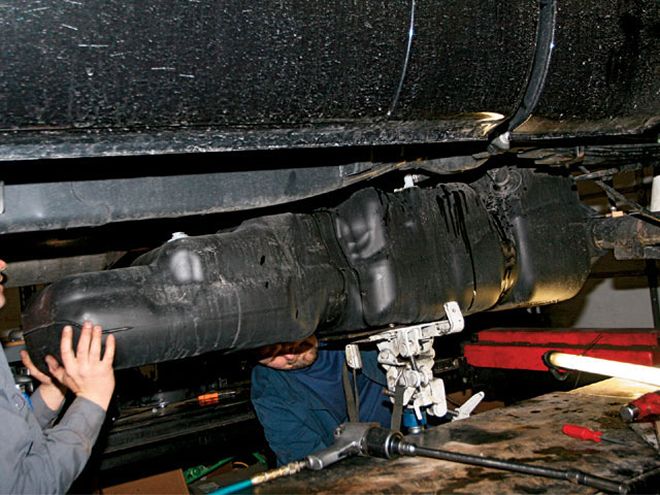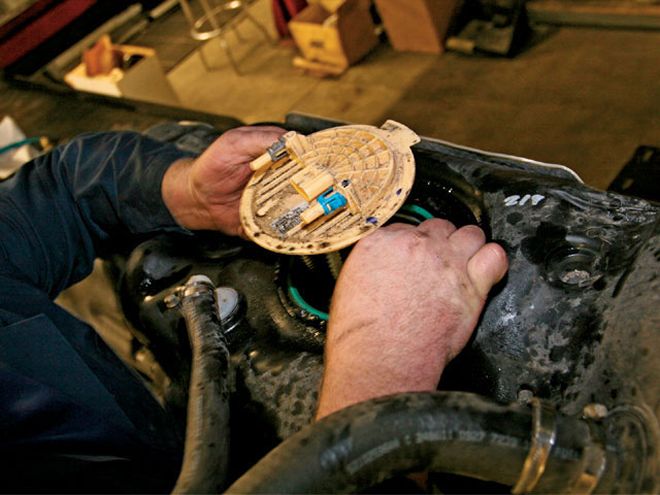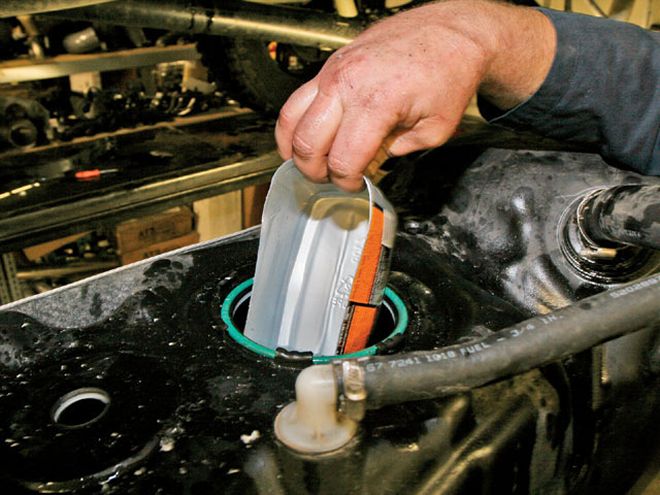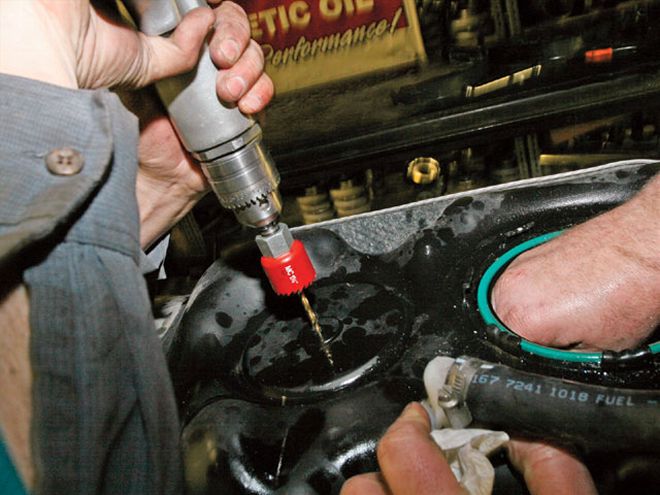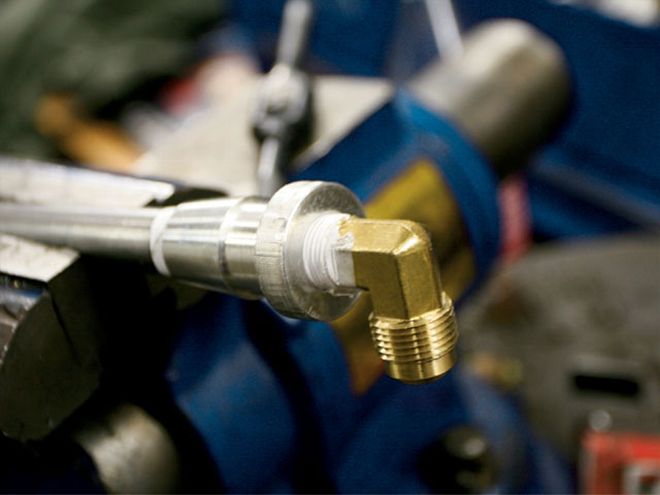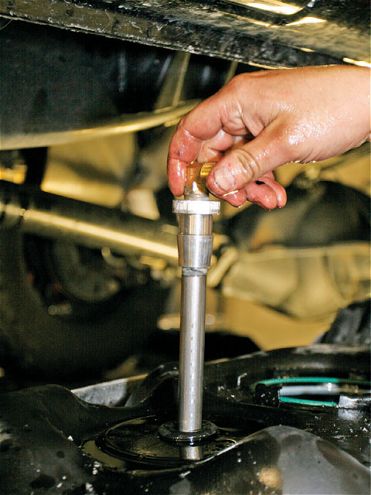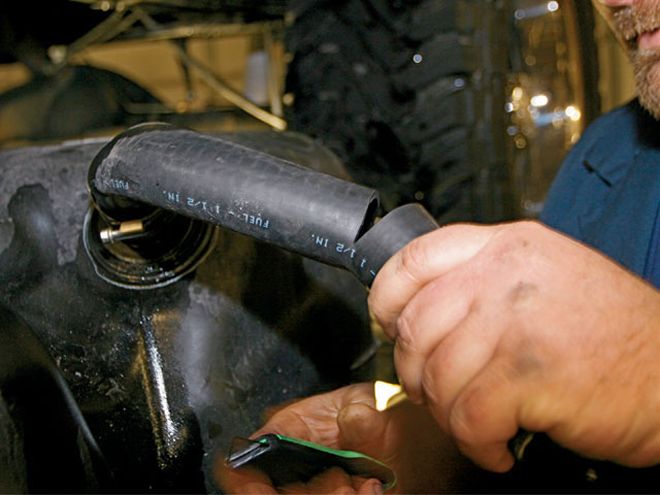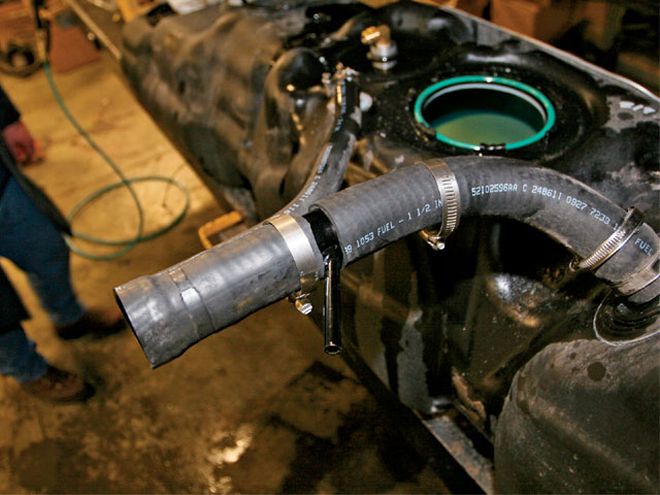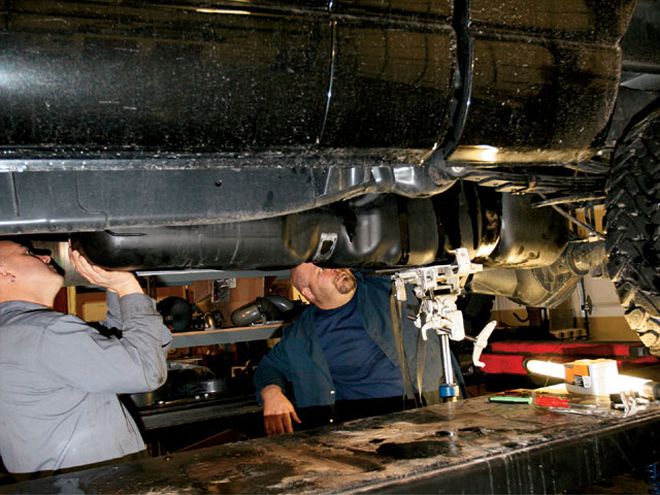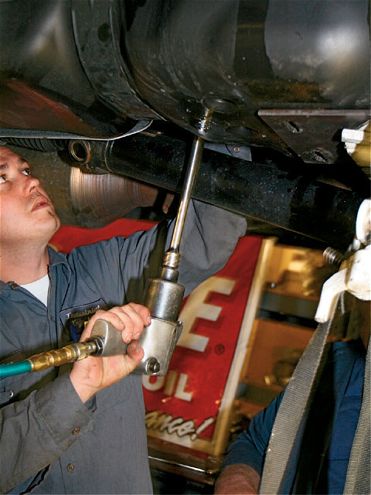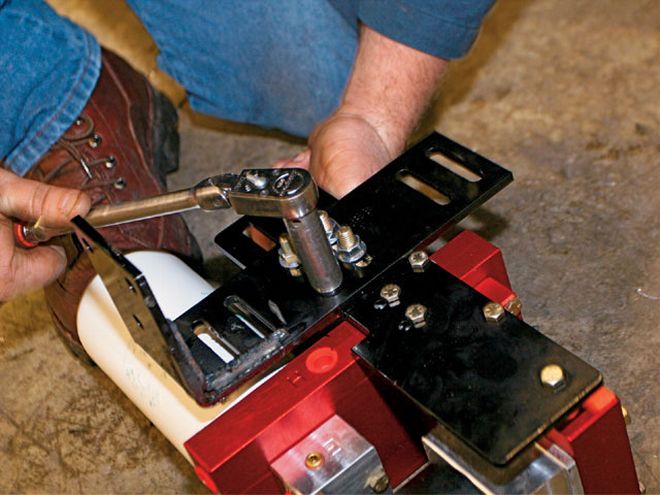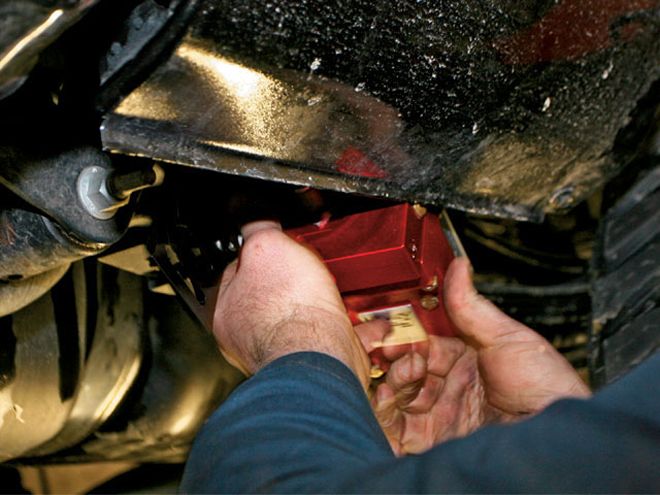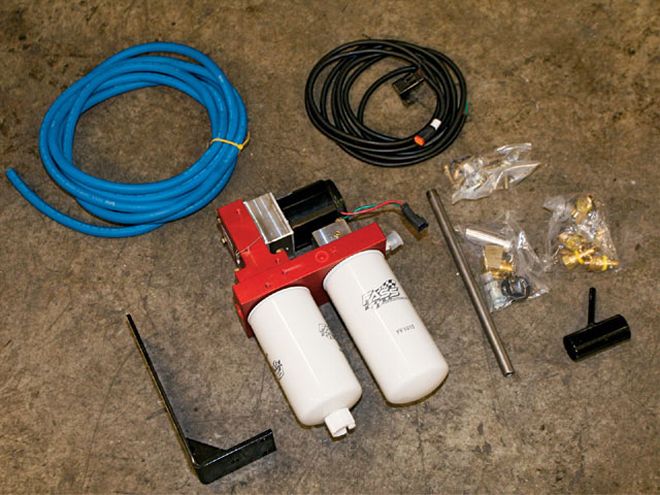
| fass Dodge Fuel Lift Pump Kit fass Kit
The power output of a diesel engine is directly proportional to the quality and quantity of the air and fuel going into and out of the combustion chambers. So naturally, most aftermarket diesel performance parts are designed to add more air and fuel into the engine. Increasing the air moving through a diesel engine tends to result in a leaner air fuel mixture, so in order to build substantial power, extra diesel fuel has to be added.
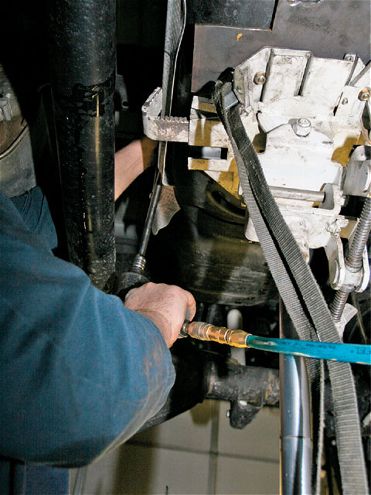
| The FASS fuel lift pump system requires its own fuel supply line from the fuel tank so Kelley Evans and Dallas Hunt removed the tank from the '08 Dodge Ram 3500. Obviously it is much easier to drop the tank when it is as close to empty as possible. Evans removed the electrical and fuel connections from the top of the tank and used a transmission jack to support the tank. With the tank supported from the underside, the tank cradles were removed.
The extra diesel fuel typically comes from an aftermarket programmer that commands the injectors to stay "On" longer and flow more fuel into the engine. Making the injectors flow more fuel certainly makes more power, but the fuel pressure coming from the injection pump may become unstable due to the fact that the factory fuel lift pump wasn't designed to support aftermarket horsepower levels.
HOW A DIESEL FUEL SYSTEM WORKS Most diesel engines use a similar fuel system design regardless of the manufacturer. Typically, a fuel tank mounted under the vehicle holds 20-40 gallons of diesel fuel. A mechanical or electric lift pump is used to bring diesel fuel from the fuel tank to the injection pump that's mounted on the engine at 5-70 psi. An injection pump then increases the diesel fuel pressure up to somewhere between 5,000-30,000 psi so that when the diesel injectors are fired, the diesel fuel mixes with the air in the combustion chamber.
FACTORY FUEL SYSTEM LIMITATIONS The factory fuel systems are generally capable of handling up to 100 hp over their factory engine ratings, but even at that level, the fuel supply delivered to the injection pump can fluctuate. The inconsistent fuel pressure can lead to losses in overall power, poor performance on the track, or even injection pump damage in extreme cases. For those of you considering adding larger injectors, twin injection pumps, and seeking four digit horsepower power levels, the factory lift pump just won't cut it.
ADDING A PERFORMANCE LIFT PUMP The FASS lift pump is designed to not only increase the amount of fuel going to the injection pump, but also to ensure that the fuel is free from water, dirt, and air. It's comprised of three main parts: a pump/filtration unit with a 95-gallon per minute fuel pump, water separator, and fuel filter. The system has its own pick-up that gets mounted in the tank, and although the stock pump and filter in Dodge applications don't need to be removed from the truck, they will no longer be used.
While performing the typical duties of pumping and filtering fuel, the FASS also removes air from the fuel. Like most liquids, diesel picks up air when it is agitated and vibrated during normal driving conditions. The air in the fuel can cause fluctuations in fuel pressure, rob the engine of performance and fuel economy, and also increase emissions. Using a patented port manifold and fuel filter, the FASS system separates the air from the fuel and returns the air/fuel back to the tank through the filler neck while another line supplies the injection pump with clean air-free fuel.
In order to learn more about the FASS system and to see how it installs, we met up with Kelley Evans from PDI at Industrial Injection in Salt Lake City, Utah. Dallas Hunt assisted Evans with the installation of a FASS 95/95/1008 system on a 6.7L Dodge Cummins.
 | fass Dodge Fuel Lift Pump Kit fass Kit
The power output of a diesel engine is directly proportional to the quality and quantity of the air and fuel going into and out of the combustion chambers. So naturally, most aftermarket diesel performance parts are designed to add more air and fuel into the engine. Increasing the air moving through a diesel engine tends to result in a leaner air fuel mixture, so in order to build substantial power, extra diesel fuel has to be added.
| fass Dodge Fuel Lift Pump Kit fass Kit
The power output of a diesel engine is directly proportional to the quality and quantity of the air and fuel going into and out of the combustion chambers. So naturally, most aftermarket diesel performance parts are designed to add more air and fuel into the engine. Increasing the air moving through a diesel engine tends to result in a leaner air fuel mixture, so in order to build substantial power, extra diesel fuel has to be added.
 | The FASS fuel lift pump system requires its own fuel supply line from the fuel tank so Kelley Evans and Dallas Hunt removed the tank from the '08 Dodge Ram 3500. Obviously it is much easier to drop the tank when it is as close to empty as possible. Evans removed the electrical and fuel connections from the top of the tank and used a transmission jack to support the tank. With the tank supported from the underside, the tank cradles were removed.
The extra diesel fuel typically comes from an aftermarket programmer that commands the injectors to stay "On" longer and flow more fuel into the engine. Making the injectors flow more fuel certainly makes more power, but the fuel pressure coming from the injection pump may become unstable due to the fact that the factory fuel lift pump wasn't designed to support aftermarket horsepower levels.
HOW A DIESEL FUEL SYSTEM WORKS
| The FASS fuel lift pump system requires its own fuel supply line from the fuel tank so Kelley Evans and Dallas Hunt removed the tank from the '08 Dodge Ram 3500. Obviously it is much easier to drop the tank when it is as close to empty as possible. Evans removed the electrical and fuel connections from the top of the tank and used a transmission jack to support the tank. With the tank supported from the underside, the tank cradles were removed.
The extra diesel fuel typically comes from an aftermarket programmer that commands the injectors to stay "On" longer and flow more fuel into the engine. Making the injectors flow more fuel certainly makes more power, but the fuel pressure coming from the injection pump may become unstable due to the fact that the factory fuel lift pump wasn't designed to support aftermarket horsepower levels.
HOW A DIESEL FUEL SYSTEM WORKS 